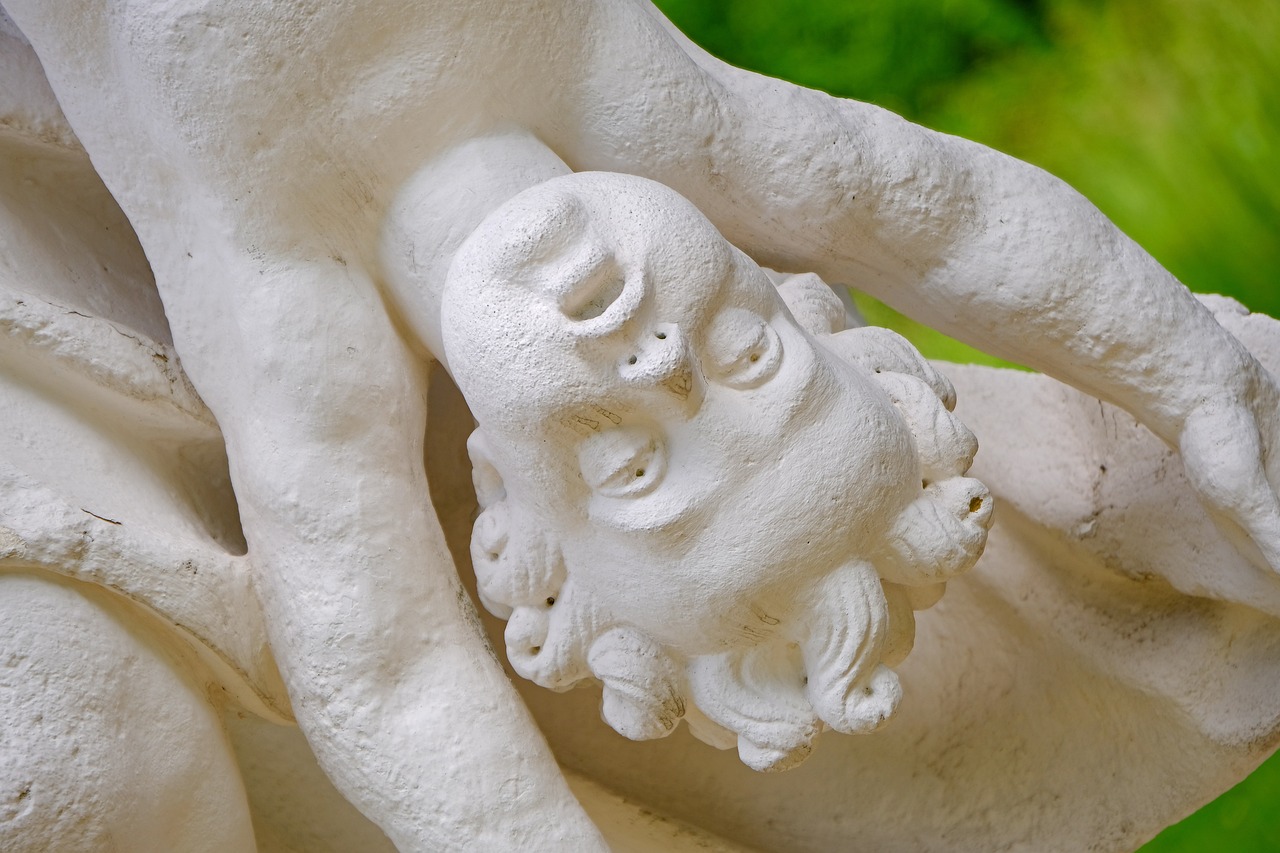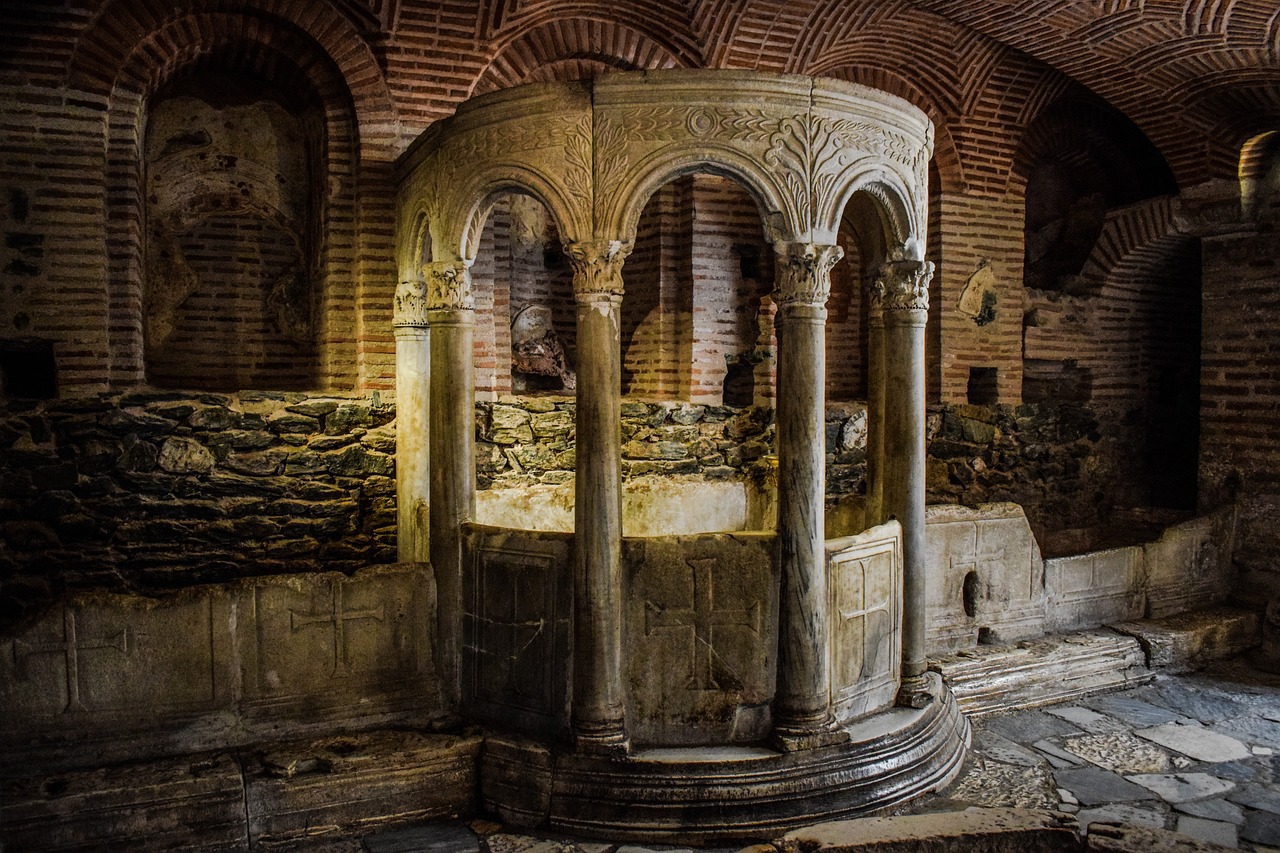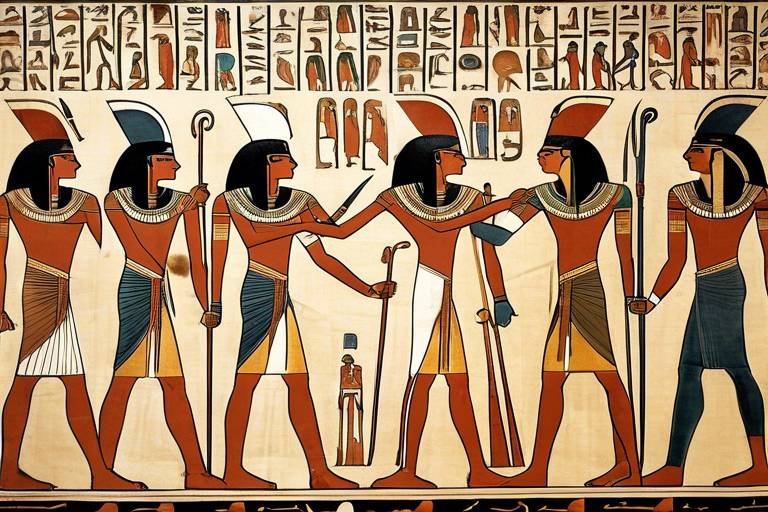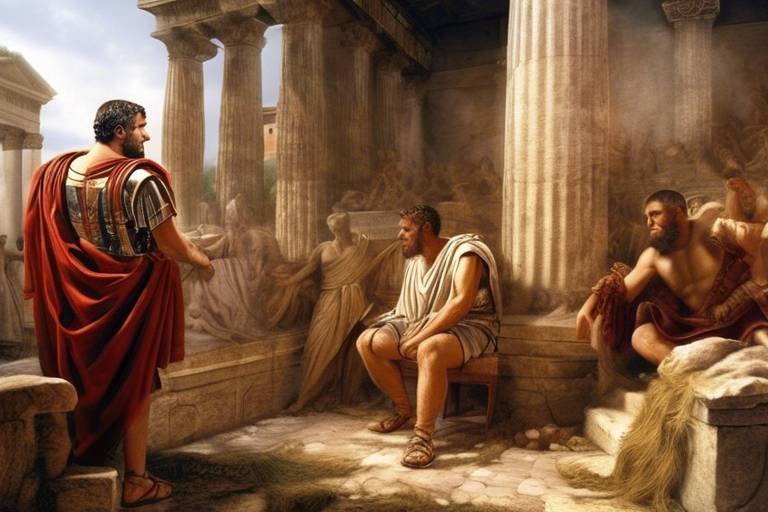The Secrets of the Ancient Greek Oracles
Delving into the mystical world of ancient Greek oracles unveils a realm of intrigue and enigma that has captivated generations. These revered seers held a significant place in Greek society, offering prophecies and guidance to those seeking insight into their futures. The methods they employed to communicate these cryptic messages were shrouded in mystery, adding to the allure and mystique surrounding their practices.
Oracles in ancient Greece played a pivotal role in shaping both personal decisions and major political events. Their origins can be traced back to the early civilizations of Greece, evolving over time to become revered institutions that influenced the course of history. Seekers from far and wide would journey to these sacred sites in search of answers to their burning questions, hoping to unravel the mysteries of fate and destiny.
Among the plethora of oracles scattered throughout ancient Greece, the Oracle of Delphi stands out as the most renowned and revered. Dedicated to the god Apollo, this sacred site housed the Pythia, a high priestess who channeled the divine messages of the gods. The prophecies delivered at Delphi held immense significance, guiding the decisions of kings, leaders, and common folk alike.
The enigmatic figure of the Pythia, the priestess of Delphi, embodied the mystical essence of the oracle tradition. Through trance-induced states, she communed with the divine, offering prophetic insights that often left seekers in awe. The rituals and ceremonies surrounding the Pythia's prophecies added to the theatricality and solemnity of the oracle experience.
Another prominent oracle in ancient Greece was the Oracle of Dodona, known for its prophetic oak tree and unique methods of divination. Seekers would listen to the rustling of leaves or the clanging of bronze vessels to interpret the messages of the gods, seeking guidance in matters of war, peace, and personal affairs.
Consulting the oracles was a complex and intricate process, involving elaborate rituals and offerings to appease the gods. Seekers would pose their questions to the oracle, receiving cryptic and often ambiguous responses that required skilled interpretation. Deciphering the oracular prophecies was no easy task, as they were laden with symbolism and metaphorical language.
Despite their enduring influence, the tradition of oracles in ancient Greece eventually waned, giving way to changing societal beliefs and the rise of rationalism. The decline of these sacred sites marked the end of an era, leaving behind a legacy that continues to fascinate and inspire modern-day scholars and enthusiasts.
The legacy of the ancient Greek oracles resonates throughout Western culture, philosophy, and literature, shaping our understanding of fate, destiny, and the mysterious workings of the universe. Their enduring impact serves as a testament to the enduring power of belief, intuition, and the eternal quest for knowledge and insight.

History of Oracles in Ancient Greece
Exploring the mystical world of ancient Greek oracles, their significance in history, and the methods they used to communicate prophecies and advice to seekers.
The history of oracles in ancient Greece dates back to the earliest civilizations of the region. Oracles were revered as conduits of divine wisdom, providing insights and guidance to individuals and communities alike. The concept of seeking oracular advice was deeply ingrained in Greek society, with people turning to these prophetic figures for answers to pressing questions and dilemmas.
Oracles evolved over time, adapting to the changing political and social landscape of ancient Greece. Initially, oracles were associated with specific deities, such as Apollo, the god of prophecy, music, and healing. As Greek city-states grew in power and influence, oracles played a crucial role in shaping important decisions, from matters of war and peace to personal affairs.
Delphi stands out as the most famous oracle in ancient Greece, renowned for its connection to the god Apollo and its central role in Greek religious practices. The Oracle of Delphi was believed to be the voice of Apollo himself, speaking through the Pythia, the high priestess of the temple.
Seekers from far and wide traveled to Delphi to consult the oracle, seeking guidance on matters of great importance. The prophecies delivered at Delphi were often cryptic and open to interpretation, leading to a rich tradition of oracular divination and speculation.
The Pythia, or priestess of Delphi, was a revered figure in ancient Greece, serving as the intermediary between the mortal world and the divine realm. During rituals at the temple, the Pythia would enter a trance-like state, believed to be possessed by the spirit of Apollo, and deliver prophecies in a frenzied manner.
Her cryptic utterances were carefully recorded and interpreted by priests and seekers, who sought to unravel the hidden meanings behind her words. The Pythia's prophecies carried immense weight and influence, shaping the course of events in Greek society.
Located in the ancient region of Epirus, the Oracle of Dodona was another prominent divination site in Greece, known for its prophetic oak tree and unique methods of communication with the divine. Priests and priestesses at Dodona interpreted the rustling of leaves and the sounds of birds to convey messages from the gods.
Seekers would present questions to the oracle, and the responses were often enigmatic and symbolic, requiring careful interpretation. The Oracle of Dodona held a special place in Greek mythology and history, attracting pilgrims and visitors seeking insights into their futures.
Consulting the oracles in ancient Greece was a ritualistic and solemn process, steeped in tradition and symbolism. Seekers would undergo purification rites before approaching the oracle, demonstrating their respect and devotion to the gods.
Rituals such as animal sacrifices, libations, and prayers were common practices during oracular consultations, aiming to appease the gods and ensure the accuracy of the prophecies. The interpretation of oracular messages required skill and insight, as the answers given were often veiled in metaphor and allegory.
Deciphering the cryptic messages of oracles posed a significant challenge to those seeking guidance. Oracular prophecies were known for their ambiguity and complexity, requiring careful analysis and reflection to uncover their true meaning.
Interpreters and scholars dedicated themselves to unraveling the mysteries of oracular pronouncements, drawing on mythological, historical, and cultural references to make sense of the prophecies. The art of interpreting oracles became a respected skill in ancient Greece, with experts sought after for their wisdom and insight.
The decline of the oracle tradition in ancient Greece marked the end of an era of mystical divination and prophecy. Various factors contributed to the waning influence of oracles, including political changes, social upheaval, and the rise of rationalism and skepticism.
As Greek society underwent transformations and new belief systems emerged, the once revered oracles gradually fell out of favor, their sanctuaries abandoned and their prophecies fading into obscurity. The end of the oracle tradition signaled a shift in the spiritual and philosophical landscape of ancient Greece.
The legacy of ancient Greek oracles endures in the annals of Western culture and thought, leaving a lasting impact on philosophy, literature, and the concept of fate and destiny. The oracles' influence can be seen in the works of great thinkers and writers, who drew inspiration from the enigmatic world of divination and prophecy.
Even today, the echoes of the oracles resonate in our understanding of the unknown and the mysterious, reminding us of the enduring quest for wisdom and insight into the workings of the universe. The legacy of the ancient Greek oracles serves as a testament to the enduring power of the human spirit in seeking answers to life's most profound questions.
Coming soon...

Delphi: The Most Famous Oracle
Exploring the mystical world of ancient Greek oracles, their significance in history, and the methods they used to communicate prophecies and advice to seekers.
Understanding the origins of oracles in Greek society, their evolution over time, and their role in shaping political and personal decisions.
Delphi, located on the slopes of Mount Parnassus, stands out as the most renowned oracle in ancient Greece. The Oracle of Delphi was dedicated to the god Apollo, known as the god of prophecy and music. Pilgrims from far and wide would journey to Delphi seeking guidance on various matters, from personal dilemmas to matters of state. The enigmatic Pythia, the high priestess of the Oracle, would enter a trance-like state, inhaling the fumes rising from a chasm in the ground, to deliver cryptic prophecies in the god's name. The influence of Delphi extended beyond just prophecy, shaping Greek culture, religion, and even political decisions.
The Pythia, also known as the Oracle priestess, was a revered figure in ancient Greece. Her prophetic utterances were highly sought after, believed to provide insights into the will of the gods. The Pythia's trance-induced state during consultations at Delphi added an aura of mystery and divine connection to the prophecies she delivered. Her words were considered sacred and were meticulously interpreted by seekers seeking guidance on important matters.
Another significant oracle in ancient Greece was the Oracle of Dodona, located in a remote region of Epirus. Unlike the Oracle of Delphi, Dodona was known for its prophetic oak tree, believed to whisper divine messages to priests. The methods of divination at Dodona were unique, involving the rustling of leaves and the interpretation of sounds to reveal the will of the gods. Although not as famous as Delphi, Dodona played a crucial role in the religious landscape of ancient Greece.
Seeking advice from the oracles was a complex and ritualistic process. Pilgrims would undergo purification rituals before approaching the Oracle, offering sacrifices and gifts to appease the gods. The cryptic responses given by the oracles required skilled interpreters to decipher their meaning, often leaving seekers pondering over the hidden messages for clarity and guidance.
Deciphering the ambiguous and symbolic nature of oracular prophecies was a daunting task for those seeking guidance. The prophecies were open to multiple interpretations, leading to confusion and uncertainty. Seekers had to rely on skilled priests and interpreters to unravel the hidden meanings and extract valuable insights from the cryptic messages delivered by the oracles.
With the rise of rationalism and skepticism in ancient Greece, the tradition of consulting oracles began to decline. The once-thriving sanctuaries of Delphi and Dodona slowly fell into obscurity as people turned towards more logical and pragmatic approaches to decision-making. The abandonment of the oracle sites marked the end of an era, signaling a shift away from mystical divination towards a more rational worldview.
The legacy of ancient Greek oracles continues to resonate in Western culture, philosophy, and literature. The concept of fate, destiny, and divine intervention explored through the oracular tradition has left a lasting impact on human thought and understanding. The enigmatic world of oracles, with its blend of mystery and wisdom, remains a fascinating subject of study and contemplation, offering insights into the complexities of the human quest for knowledge and guidance.

Pythia: The Priestess of Delphi
Exploring the mystical world of ancient Greek oracles, their significance in history, and the methods they used to communicate prophecies and advice to seekers.
Understanding the origins of oracles in Greek society, their evolution over time, and their role in shaping political and personal decisions.
Delving into the mysteries of the Oracle of Delphi, its connection to the god Apollo, and its influence on Greek culture and religion.
In the heart of the Oracle of Delphi resided the Pythia, a revered priestess who served as the conduit between the mortal realm and the divine. Clad in ceremonial robes, she sat upon a sacred tripod, inhaling the fumes of burning bay leaves and barley, inducing a trance-like state. In this altered consciousness, the Pythia channeled the words of Apollo, delivering cryptic prophecies that could shape the course of empires and individuals alike.
Exploring the ancient oracle located in Dodona, known for its prophetic oak tree and unique methods of divination.
Examining the process of seeking advice from oracles, the rituals involved, and the interpretation of their cryptic messages.
Decoding the ambiguous and symbolic nature of oracular prophecies and the challenges faced by those seeking guidance.
Investigating the decline of the oracle tradition in ancient Greece and the factors that led to the eventual abandonment of these sacred sites.
Reflecting on the lasting impact of ancient Greek oracles on Western culture, philosophy, and the concept of fate and destiny.

Oracle of Dodona
The Oracle of Dodona holds a unique place in ancient Greek divination, renowned for its distinctive methods and sacred oak tree. Situated in the northwestern region of Epirus, Dodona was considered one of the oldest oracles in Greece, predating even the Oracle of Delphi. Unlike the Pythia of Delphi, the Oracle of Dodona was believed to communicate through the rustling of oak leaves or the sound of bronze cauldrons, providing cryptic messages to those who sought guidance.

Consulting the Oracles
Consulting the Oracles was a solemn and intricate process that held immense significance in ancient Greek society. Seekers would embark on a journey to sacred sites like Delphi or Dodona, where the oracles resided, seeking guidance and insight into their future. The rituals involved in consulting the oracles were elaborate and filled with symbolism, emphasizing the mystical nature of the experience. Visitors would often bring offerings to appease the gods and gain favor before posing their questions to the oracle.
Upon reaching the oracle, seekers would present their inquiries to the priestess or priest in charge, who would then enter a trance-like state to receive divine messages. The cryptic responses given by the oracle were open to interpretation, requiring skilled priests or interpreters to decipher their meaning. The messages were often veiled in metaphor and symbolism, making it a challenging task to unravel the true intent behind the prophecy.
Some seekers would consult multiple oracles to cross-reference their responses and gain a more comprehensive understanding of their future. The oracles' advice was highly sought after, especially in times of war, political turmoil, or personal crisis, as they were believed to possess a direct link to the gods and the wisdom of the universe.
Interpreting the messages received from the oracles required a deep understanding of Greek mythology, symbolism, and cultural beliefs. The oracles' prophecies were not always straightforward and often required a nuanced approach to uncover their true meaning. Seekers would consult with priests, philosophers, and scholars to decipher the messages and apply them to their lives or decision-making processes.
Overall, consulting the oracles was a profound and transformative experience for ancient Greeks, shaping their beliefs, decisions, and actions based on the guidance received from these revered sources of wisdom and foresight.

Interpreting Oracular Prophecies
Interpreting oracular prophecies in ancient Greece was a complex and intricate process that required a deep understanding of symbolism and metaphor. Seekers who visited the oracles often received cryptic messages that needed to be deciphered to reveal their true meaning. The oracles, such as the Oracle of Delphi and Dodona, spoke in riddles and ambiguous language, leaving room for interpretation and speculation.
Interpreters, known as priests or priestesses, played a crucial role in decoding the prophecies for the seekers. They were skilled in unraveling the hidden messages and translating them into actionable advice. These interpreters acted as mediators between the divine realm and the mortal world, bridging the gap between the supernatural and the earthly.
One of the challenges faced in interpreting oracular prophecies was the dual nature of the messages. They often had multiple meanings and could be interpreted in different ways depending on the context. Deciphering these prophecies required a blend of intuition, knowledge of mythology, and an understanding of the cultural beliefs of the time.
Moreover, the seekers themselves played a significant role in the interpretation process. Their beliefs, fears, and desires influenced how they perceived the prophecies and guided them in making decisions based on the advice received. The oracles served as mirrors reflecting the innermost thoughts and emotions of the seekers, shaping their understanding of the messages.
In essence, interpreting oracular prophecies was a collaborative effort between the divine, the interpreters, and the seekers. It was a mystical journey into the realm of the unknown, where each symbol, word, and gesture held profound significance and carried the weight of destiny.

End of the Oracle Tradition
Exploring the mystical world of ancient Greek oracles, their significance in history, and the methods they used to communicate prophecies and advice to seekers.
Understanding the origins of oracles in Greek society, their evolution over time, and their role in shaping political and personal decisions.
Delving into the mysteries of the Oracle of Delphi, its connection to the god Apollo, and its influence on Greek culture and religion.
Unveiling the enigmatic figure of the Pythia, the high priestess of the Oracle of Delphi, and her trance-induced prophecies.
Exploring the ancient oracle located in Dodona, known for its prophetic oak tree and unique methods of divination.
Examining the process of seeking advice from oracles, the rituals involved, and the interpretation of their cryptic messages.
Decoding the ambiguous and symbolic nature of oracular prophecies and the challenges faced by those seeking guidance.
Investigating the decline of the oracle tradition in ancient Greece and the factors that led to the eventual abandonment of these sacred sites.
Reflecting on the lasting impact of ancient Greek oracles on Western culture, philosophy, and the concept of fate and destiny.

Legacy of the Oracles
Exploring the mystical world of ancient Greek oracles, their significance in history, and the methods they used to communicate prophecies and advice to seekers.
Understanding the origins of oracles in Greek society, their evolution over time, and their role in shaping political and personal decisions.
Delving into the mysteries of the Oracle of Delphi, its connection to the god Apollo, and its influence on Greek culture and religion.
Unveiling the enigmatic figure of the Pythia, the high priestess of the Oracle of Delphi, and her trance-induced prophecies.
Exploring the ancient oracle located in Dodona, known for its prophetic oak tree and unique methods of divination.
Examining the process of seeking advice from oracles, the rituals involved, and the interpretation of their cryptic messages.
Decoding the ambiguous and symbolic nature of oracular prophecies and the challenges faced by those seeking guidance.
Investigating the decline of the oracle tradition in ancient Greece and the factors that led to the eventual abandonment of these sacred sites.
Reflecting on the lasting impact of ancient Greek oracles on Western culture, philosophy, and the concept of fate and destiny.
Frequently Asked Questions
- What were the main purposes of ancient Greek oracles?
Ancient Greek oracles served as mediums through which individuals sought guidance, advice, and prophecies regarding various aspects of their lives, such as personal decisions, political matters, and even military strategies.
- How did the Oracle of Delphi operate?
The Oracle of Delphi, dedicated to the god Apollo, operated through the Pythia, a priestess who entered a trance-like state to deliver prophecies in response to questions posed by visitors. These prophecies were often cryptic and required interpretation.
- What led to the decline of the oracle tradition in ancient Greece?
Several factors contributed to the decline of the oracle tradition, including the rise of Christianity, which viewed oracles as pagan practices, as well as the diminishing influence of the Greek city-states and the changing political landscape.
- How did the legacy of ancient Greek oracles impact Western culture?
The legacy of ancient Greek oracles left a lasting impact on Western culture by influencing philosophical thought, shaping concepts of fate and destiny, and contributing to the development of literature, art, and drama that explored themes of prophecy and divination.



















